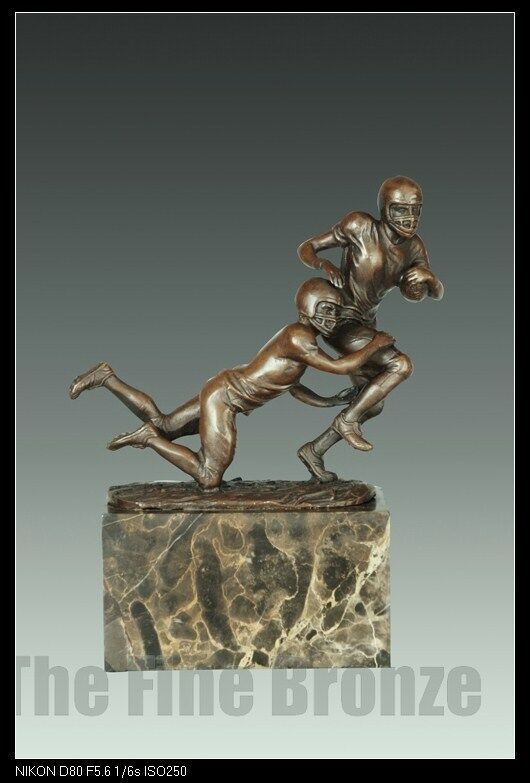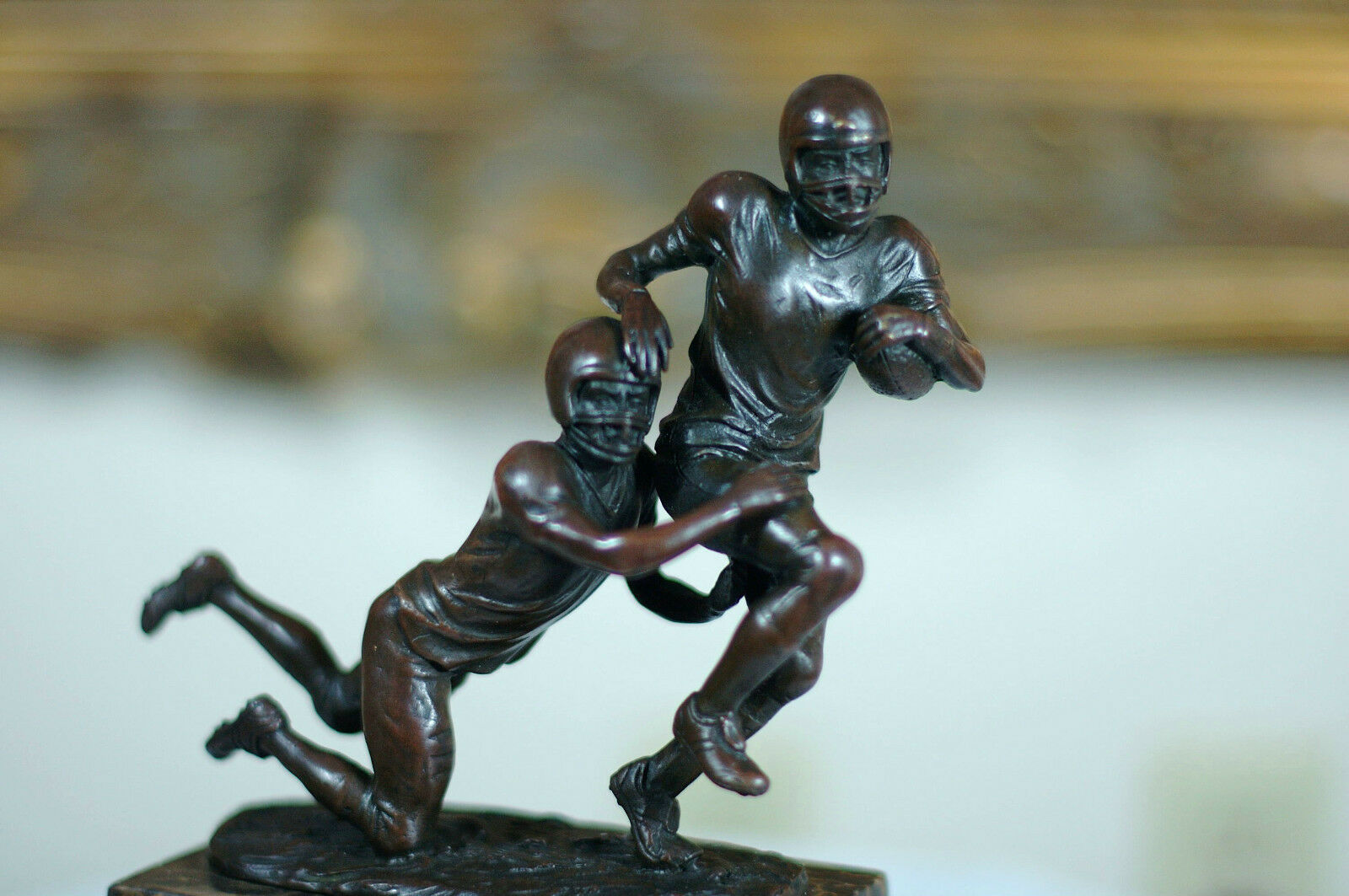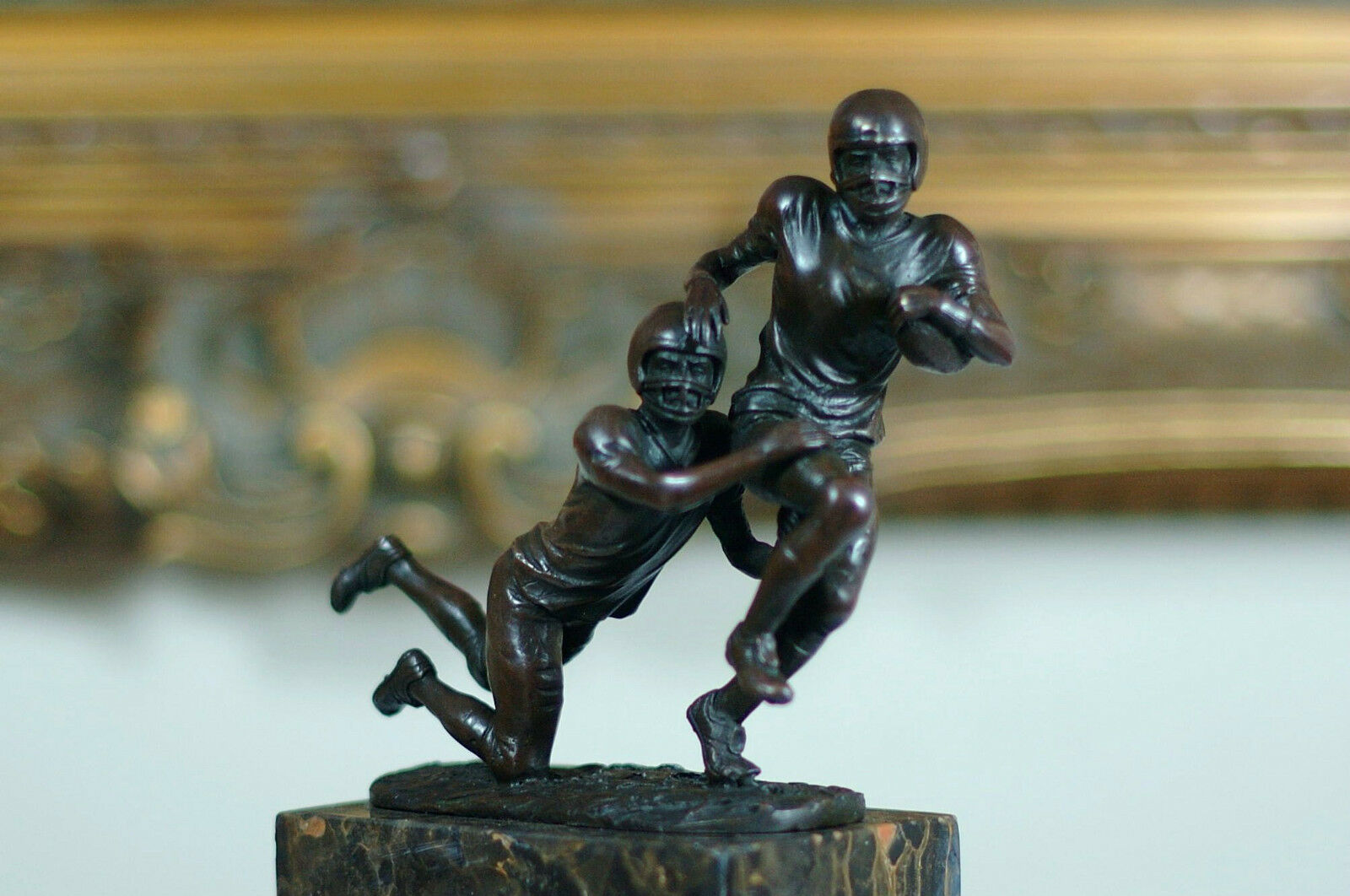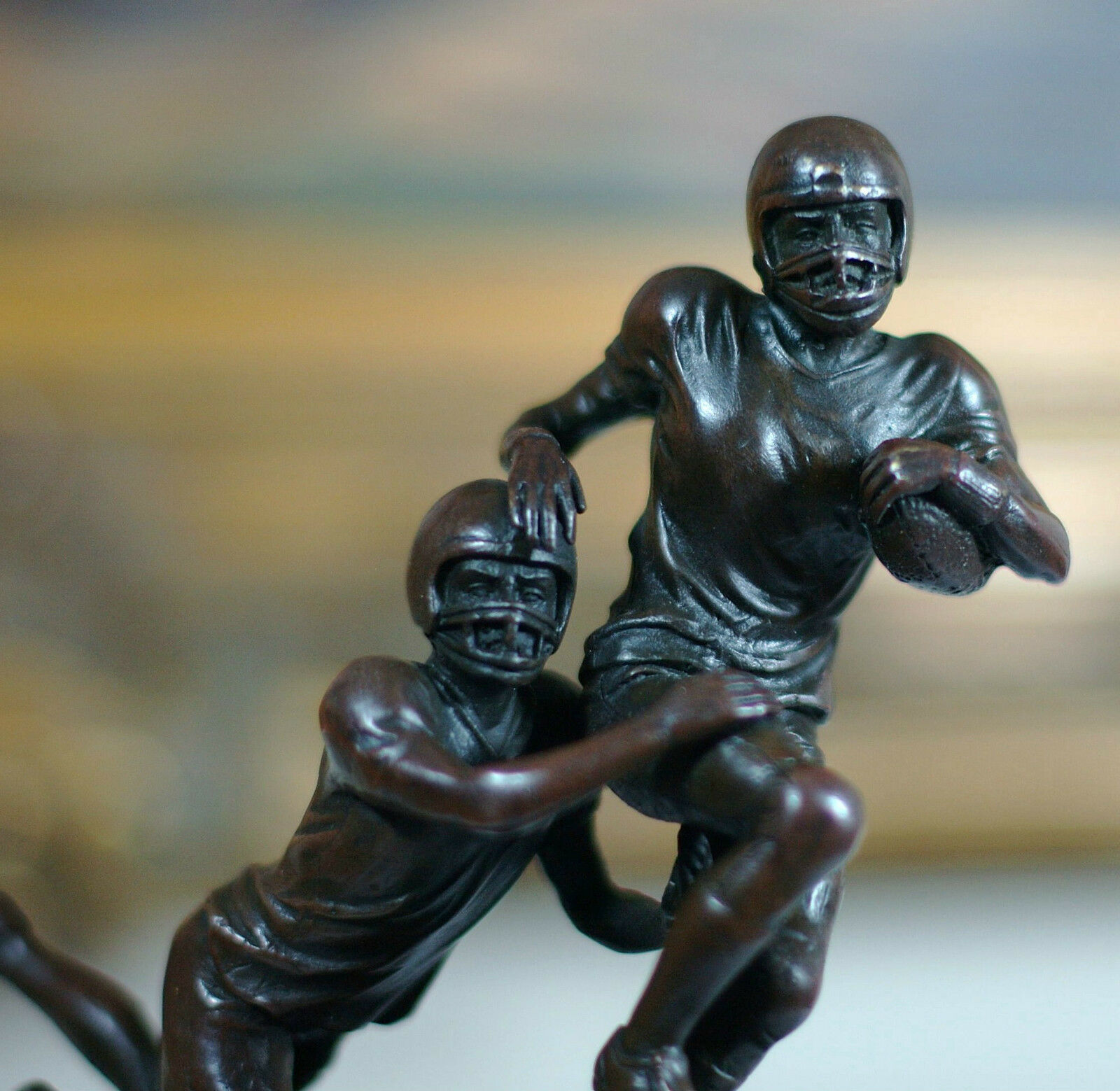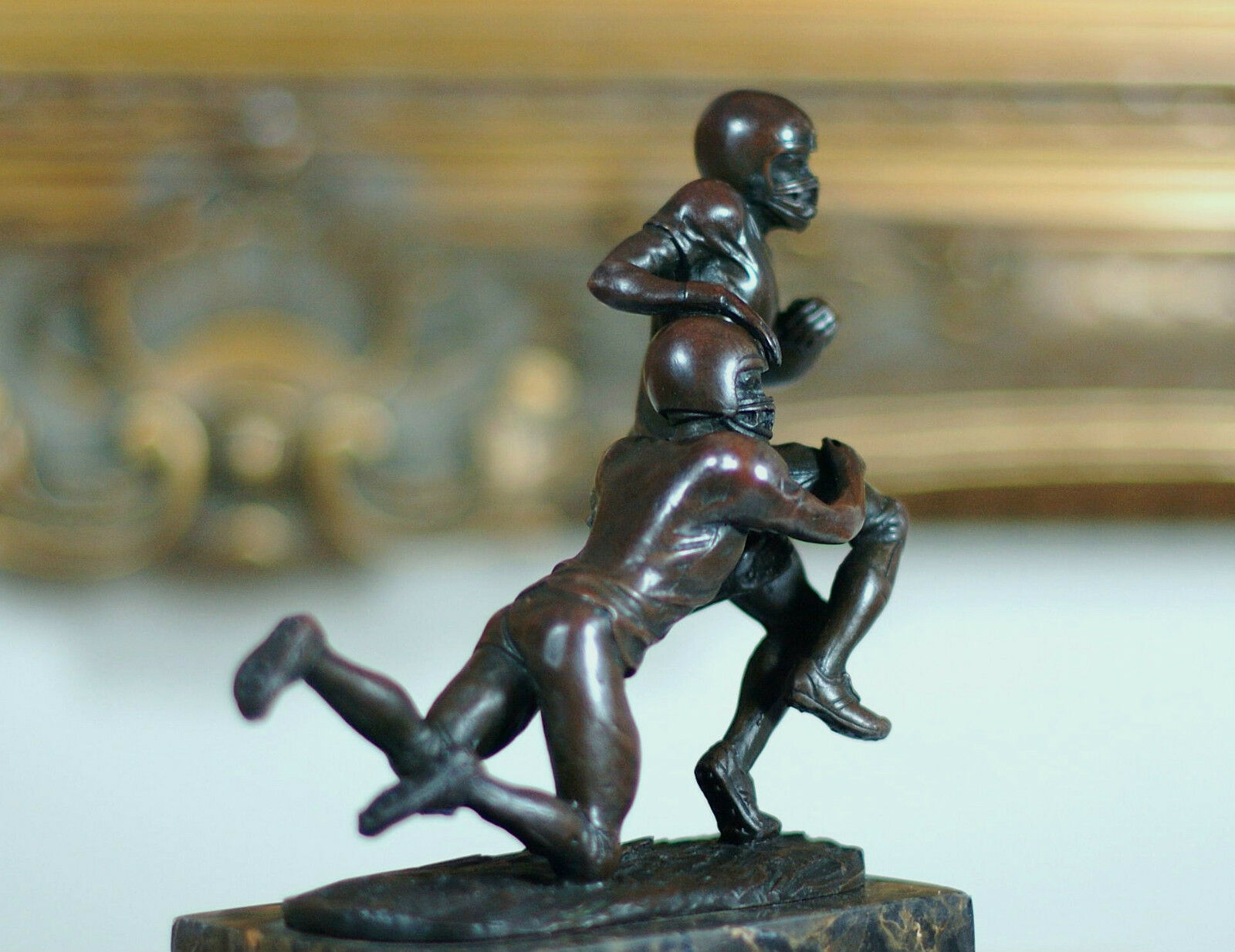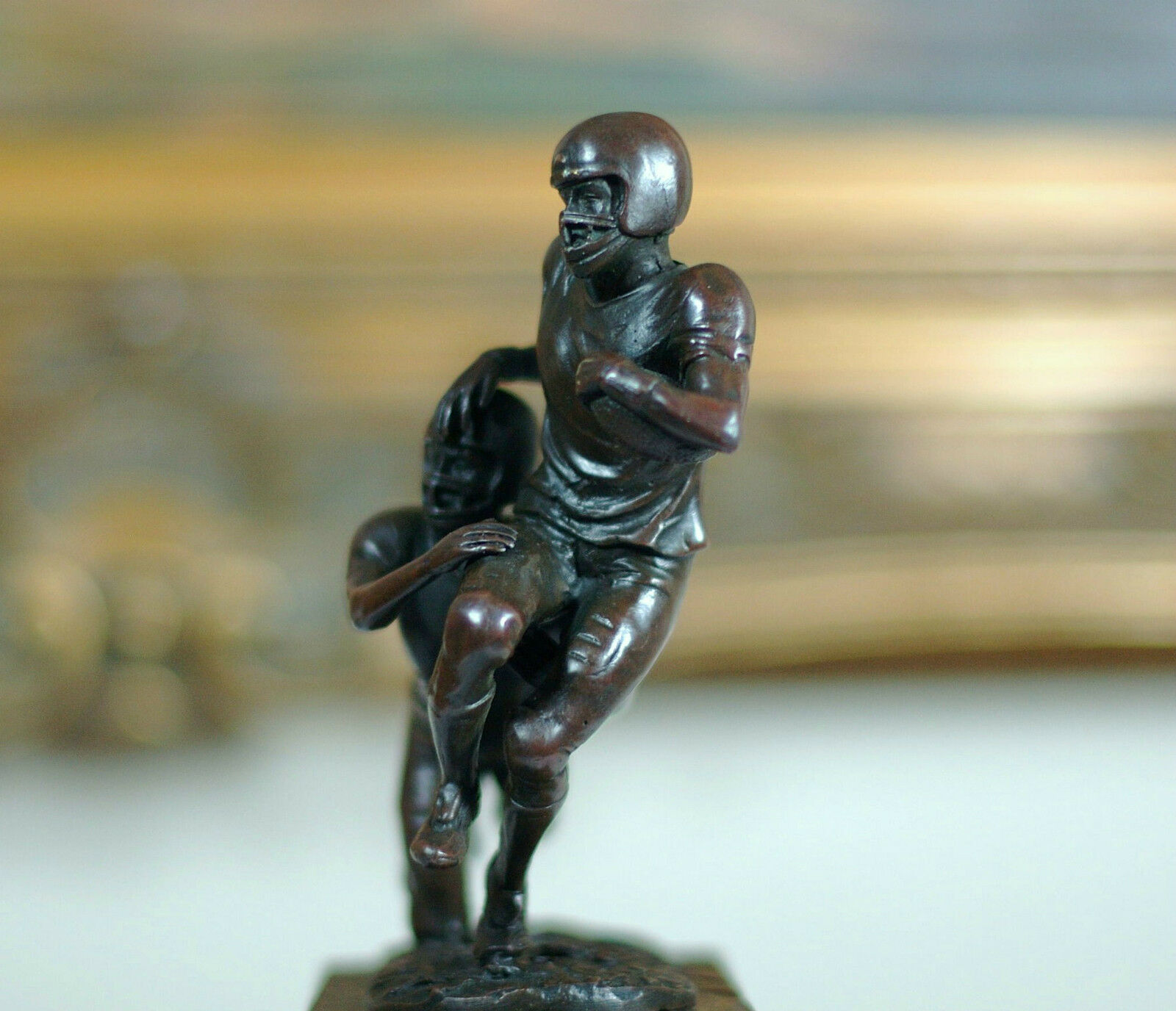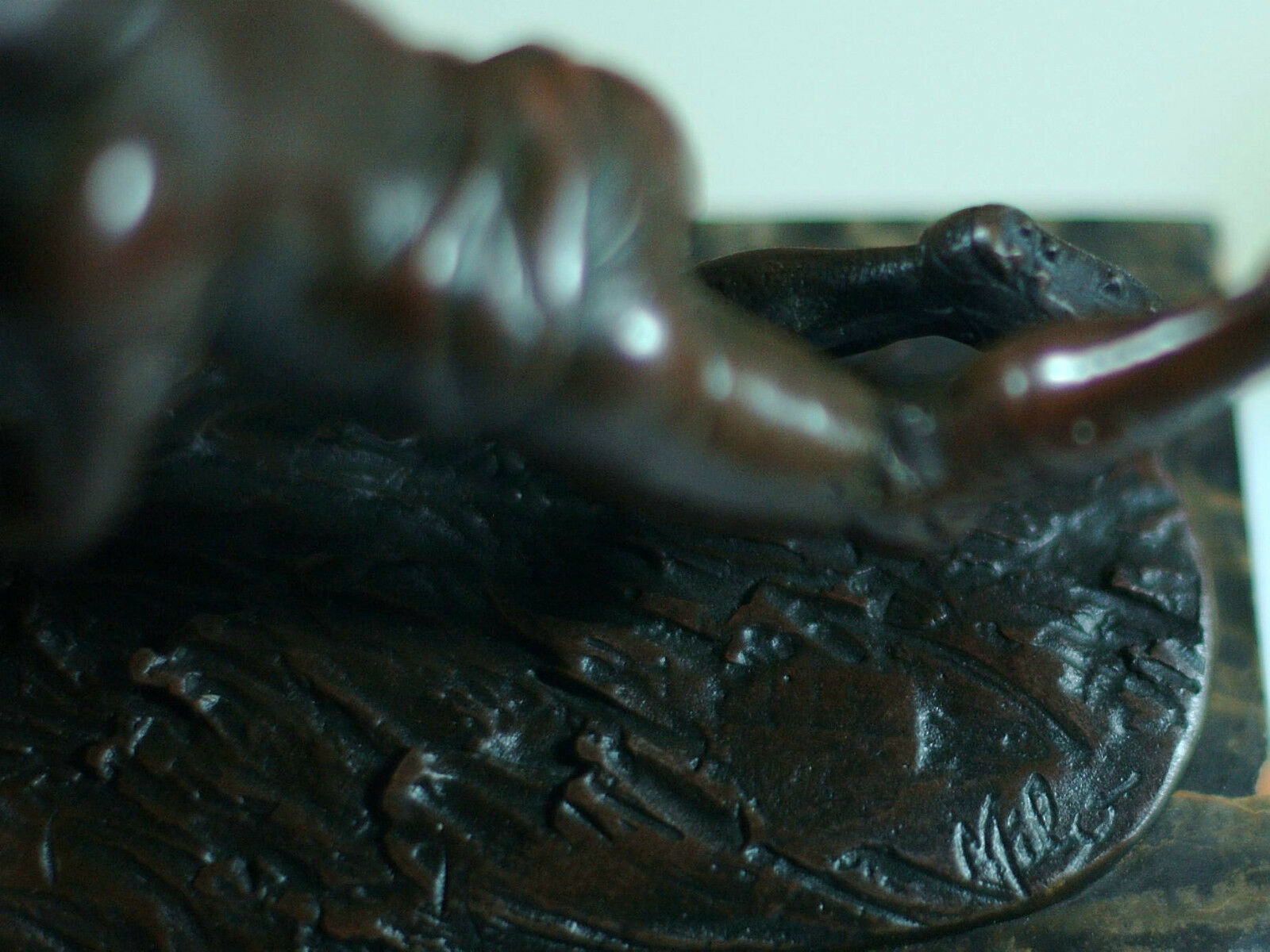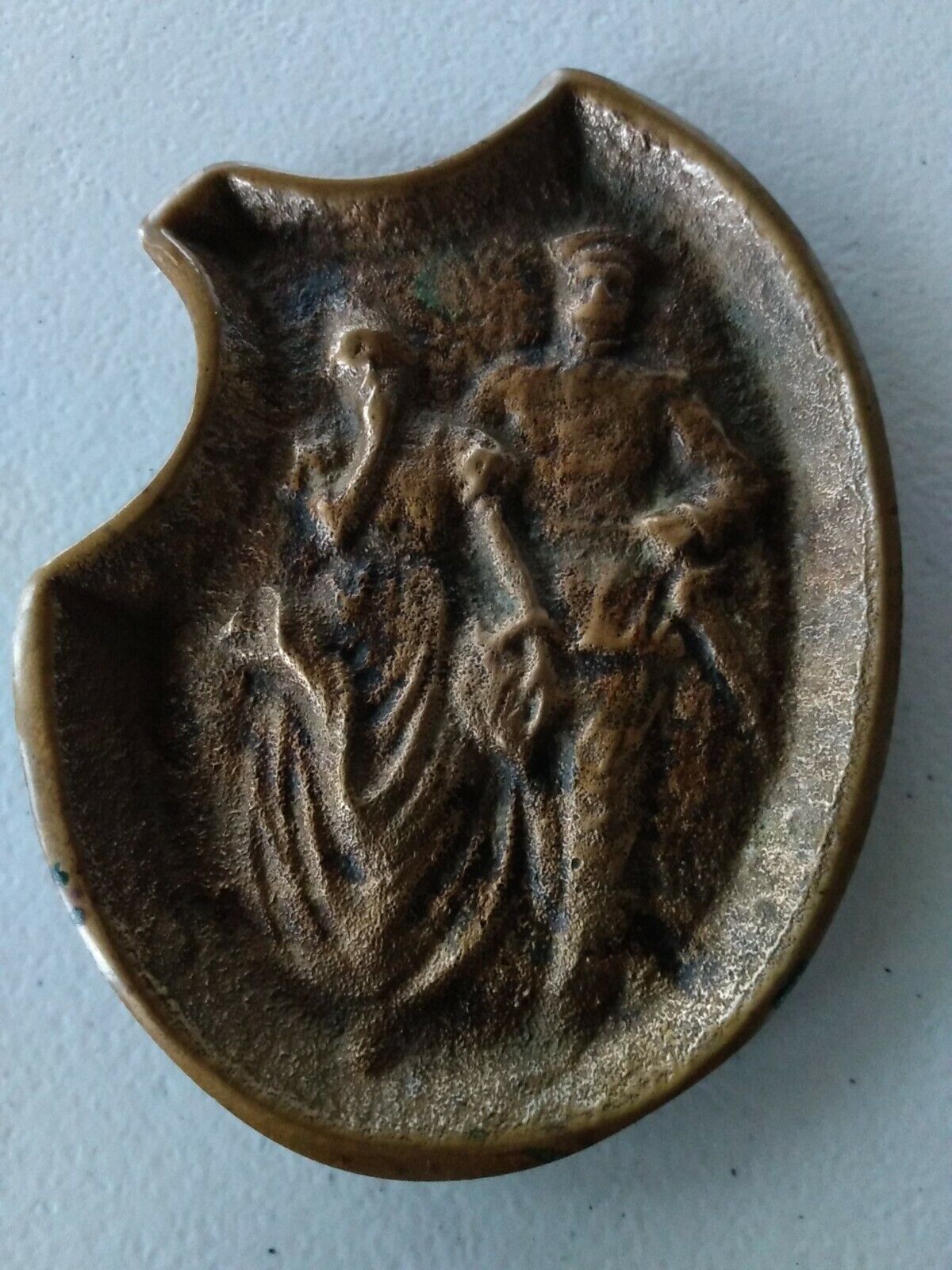-40%
Bronze Two Football Player Sculpture Figurine Bronze Statue, Signed: Milo
$ 105.59
- Description
- Size Guide
Description
Many bronze sculptures on the market today are mass-manufactured using very low quality standards. A bronze sculpture collection is a wonderful thing. A quality bronze sculpture will last for hundreds of years. The artistry and craftsmanship will amaze you every time you look at it. However, a poor quality piece can be an eyesore and a decision that you regret every time you look at it. We suggest you compare our bronzes with other Ebay sellers especially the face and proportion of the body. You should be able to tell the differences. Seventy percent of our business comes from repeat customers or referrals from customers. That is a fact in which we take a great deal of pride and speaks volumes about the quality of our collection. If you can find the same quality bronze sculpture or statue at a better price we will match it! A word to the wise is to spend a little more and buy a piece you will be proud to display and will be an heirloom in your family for many generations to come.We ONLY carry high quality bronze sculptures.
Description
We are proud to present this rare and finely sculpted bronze statue. It is in very good condition with no chips, cracks, or restoration of any kind.
This item is a true bronze collector's piece. Please see all pictures below. A great piece of a classical bronze,
100% lost-wax,
high quality bronze material and casting, amazing details for collectors or bronze lovers
.
Be sure to visit our other auctions for more bronze statue! We are listing a huge collection of bronze statues in our Ebay store, visit our Ebay Store!
or Check out our
other items
!
Condition: This bronze sculpture is in a very
GOOD
condition.
Overall Size: Height 9" x 6.5" x 3"
Weight : 4 LBS
Signature: milo
Material: Bronze
Base: Marble
About The Fine Bronze
We have collected bronzes many years worldwide and our collection reflects high standard museum quality 100% lost-wax real bronze masterpieces, these bronzes are certain to be long term investments and treasured by generation to generation.
Our mission
is to bring our customers the finest quality bronze art at the most affordable prices. We pride ourselves in carrying only high quality works of art. Look through our collection and I think you will agree! For the quality we offer, our prices just cannot be beat.
Store Policy, Payment, Shipping, Insurance & Return Policy
We represent items the best way possible with detailed images to the best of our knowledge. Please consider all photographs as representative as the text. If you have questions we will be happy to answer any inquiries.
Credit card transactions are accepted through PayPal for Domestic and International Buyers. We also accept other payment forms for domestic buyer, please contact us if you have any questions.
Buyer to pay all shipping charges unless the items we offered for free shipping.
We rely on UPS and USPS for domestic and International shipping, therefore shipping times vary.
Shipping Insurance is highly recommended, Insurance can be included at the buyer's expense.
We take the utmost care in professionally packing your item for transit but there is still the chance that it could arrive damaged. Shipping Insurance is highly recommended, if you do not take insurance, we are not responsible for any damage incurred to uninsured items.
We try to describe each item as accurately as possible or will have enough photos to show item details and condition. Returns are only accepted for errors in description.
If we accept your return, we will issue a refund upon receipt of your item provided that it is returned in its original packaging & is in the same condition as it was when it was sent. We will not refund return shipping fees unless we sent you an incorrect item.
seller added the following information:
International Non-USA customers---Please Note: you may be responsible for all duties, tax, & brokerage fees as required by country laws. These charges are not included in the item price and shipping charges. Please check with your country customs office to determine what these additional costs will be prior to bidding. These charge are normally collected by the delivering freight(shipping) company or when you pick the item up, Do not confuse them for additional shipping charges.
For all the items offered free shipping is only for lower 48 states in united states. We do ship to Hawaii, Alaska, Canada, Puerto Rico, APO/AE, and U.S. Virgin Islands, however, an additional charge may be required. Please contact us before making any purchases in these areas.
About Bronze
Bronze
is the most popular metal for
cast
metal
sculptures
; a cast
bronze sculpture
is often called simply a "bronze".
Common bronze alloys have the unusual and desirable property of expanding slightly just before they set, thus filling the finest details of a mold. Then, as the bronze cools, it shrinks a little, making it easier to separate from the mold.
[1]
Their strength and ductility (lack of brittleness) is an advantage when figures in action are to be created, especially when compared to various
ceramic
or stone materials (such as
marble sculpture
). These qualities allow the creation of extended figures, as in
Jeté
, or figures that have small cross sections in their support, such as the equestrian statue of
Richard the Lionheart
. Modern
statuary bronze
is 90%
copper
and 10%
tin
; older bronze alloys varied only slightly from this composition.
[2]
But the value of the bronze for uses other than making statues is disadvantageous to the preservation of sculptures; few large ancient bronzes have survived, as many were melted down to make weapons or ammunition in times of war or to create new sculptures commemorating the victors, while far more stone and ceramic works have come through the centuries, even if only in fragments. As recently as 2007 several life sized bronze sculptures by
John Waddell
were stolen, likely because of the value of the metal after the work has been melted.
[3]
History
The great civilizations of the old world worked in bronze for art, from the time of the introduction of the alloy for edged weapons. The Greeks were the first to scale the figures up to life size. Few examples exist in good condition; one is the seawater-preserved bronze now called "The Victorious Athlete," which required painstaking efforts to bring it to its present state for museum display. Far more Roman bronze statues have survived.
The ancient Chinese knew both
lost-wax casting
and section mould casting, and in the
Shang Dynasty
created large ritual vessels covered with complex decoration which have survived in tombs. Over the long creative period of Egyptian dynastic art, small lost-wax bronze figurines were made in large numbers; several thousand of them have been conserved in museum collections.
From the ninth through the thirteenth century the
Chola dynasty
in South India represented the pinnacle of bronze casting in India.
[4]
Lost wax method
In lost-wax or investment casting, the artist starts with a full-sized model of the sculpture, most often a non-drying oil-based clay such as
Plasticine
model for smaller sculptures or for sculptures to be developed over an extended period (water-based clays must be protected from drying), and water-based clay for larger sculptures or for sculptures for which it is desired to capture a
gestural
quality - one that transmits the motion of the sculptor in addition to that of the subject. A mold is made from the clay pattern, either as a piece mold from plaster, or using flexible gel or similar rubber-like materials stabilized by a plaster jacket of several pieces. Often a
plaster
master will be made from this mold for further refinement. Such a
plaster
is a means of preserving the artwork until a patron may be found to finance a bronze casting, either from the original molds or from a new mold made from the refined plaster positive.
Once a production mold is obtained, a wax (hollow for larger sculptures) is then cast from the mold. For a hollow sculpture, a
core
is then cast into the void, and is retained in its proper location (after wax melting) by pins of the same metal used for casting. One or more wax
sprues
are added to conduct the molten metal into the sculptures - typically directing the liquid metal from a pouring cup to the bottom of the sculpture, which is then filled from the bottom up in order to avoid splashing and turbulence. Additional sprues may be directed upward at intermediate positions, and various vents may also be added where gases could be trapped. (Vents are not needed for ceramic shell casting, allowing the sprue to be simple and direct.) The complete wax structure (and core, if previously added) is then invested in another kind of mold or shell, which is heated in a kiln until the wax runs out and all free moisture is removed. The investment is then soon filled with molten bronze. The removal of all wax and moisture prevents the liquid metal from being explosively ejected from the mold by steam and vapor.
Students of bronze casting will usually work in
direct wax
, where the model is made in wax, possibly formed over a core, or with a core cast in place, if the piece is to be hollow. If no mold is made and the casting process fails, the artwork will also be lost. After the metal has cooled, the external ceramic/clay is chipped away, revealing an image of the wax form, including core pins, sprues, vents, and risers. All of these are removed with a saw and tool marks are polished away, and interior core material is removed to reduce the likelihood of interior corrosion. Incomplete voids created by gas pockets or investment inclusions are then corrected by welding and carving. Small defects where sprues and vents were attached are filed or ground down and polished.
Creating large sculptures
For a large sculpture, the artist will usually prepare small study models until the pose and proportions are determined. An intermediate-sized model is then constructed with all of the final details. For very large works, this may again be scaled to a larger intermediate. From the final scale model, measuring devices are used to determine the dimensions of an armature for the structural support of a full-size temporary piece, which is brought to rough form by wood, cardboard, plastic foam, and/or paper to approximately fill the volume while keeping the weight low. Finally, plaster, clay or other material is used to form the full-size model, from which a mould may be constructed. Alternatively, a large refactory core may be constructed, and the direct-wax method then applied for subsequent investment. Before modern welding techniques, large sculptures were generally cast in one piece with a single pour. Welding allows a large sculpture to be cast in pieces, then joined.
Finishing
After final polishing, corrosive materials may be applied to form a
patina
, a process that allows some control over the color and finish.
Upon receipt of your order, please check to make sure all contents are included and no damage has occurred in transit. Claims for damaged or missing items must be reported within 3 business days of delivery.
